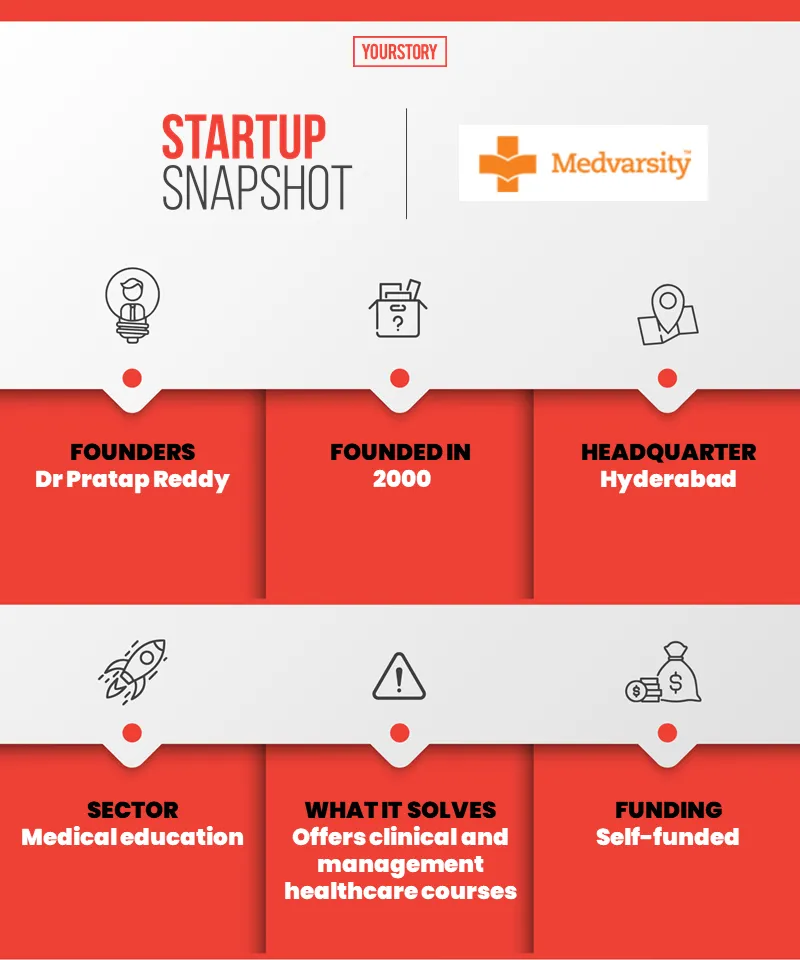Backed by Apollo Group, this edtech startup aims to bridge skills gap in the healthcare space
Hyderabad-based healthcare-focused edtech startup Medvarsity offers 140 courses in clinical and management areas for doctors, nurses, and general management personnel. It claims to have trained over three lakh medical professionals till now.
India has a 1.3 billion-strong population. But do we have enough skilled healthcare professionals to address present and future needs?
The coronavirus pandemic has put the spotlight on the importance of quality healthcare to promote and maintain good health, prevent and manage diseases, reduce disability and premature death, and achieve health equity.
But India still has miles to go when it comes to healthcare.
Over the last 10 years, public spending on healthcare has been a meagre 1 percent of GDP, way lower than the average for OECD countries (8.8 percent in 2018.) The country has a poor ratio of healthcare professionals: one doctor for every 1,404 people and one nurse for every 675 people. This is far lower than WHO's prescribed norm of one doctor and three nurses per 1,000 people.
The gaps in healthcare education led to the birth of Hyderabad-based Medvarsity, which was established and promoted by Apollo Group in 2000 with one vision: impacting healthcare through education.
Launched as Apollo , the company was rebranded as Medvarsity Online in 2016 with the launch of a new website. Gerald Jaideep took over as CEO and the online varsity has over the years evolved into Asia’s largest healthcare edtech company.

The team at Medvarsity
Medvarsity offers more than 140 courses in clinical and management areas for doctors, nurses, and general management personnel, including specialties such as diabetes, emergency medicine, cardiology, nutrition, wellness, healthcare informatics, mental health, NABH, and telemedicine. As many as three lakh medical professionals have been trained and certified.
It has partnered with leading universities as its accreditation partners, including eCornell, Amity University, Royal Liverpool Academy, and Health Education England. Max Healthcare, Apollo Hospital, KIMS, Medicover, and Columbia Asia are Clinical Training Partners to provide necessary training to students posted for the contact programme training for each course, under a structure and quality framework provided by Medvarsity.
“Our technology-based learning makes it convenient for students to pursue courses anytime, anywhere. Lectures are delivered online in the form of video lessons and live virtual classes. Our content team comprises medical graduates or postgraduates with relevant clinical experience,” Gerald says.
Medvarsity’s vision is being fulfilled by a team of 180 professionals, including doctors, management professionals, designers, storytellers, and technologists.
Many Medvarsity alumni are now top professionals working across leading hospitals and other healthcare organisations.
Growing in the time of COVID-19
The pandemic disrupted most businesses in the world, but Medvarsity took the crisis as an opportunity to hire more people and build a wide and effective talent pool. With many large organisations announcing layoffs, people are looking for an opportunity to upskill and stay employed.
“We wanted to make sure that we were able to get the right pool of talent while preparing the existing workforce for our future growth. We invested in hiring people across sales, product, marketing, and other core functions. We increased manpower strength by 20 percent during the pandemic,” says Gerald, who was COO of Simplilearn Solutions prior to Medvarsity.

Medvarsity claims to have educated more than 1.6 lakh healthcare professionals on COVID-19: Awareness and Management for free, in partnership with FICCI and NATHEALTH.
This free online course educates people about mode of transmission, clinical presentation and diagnosis, preventive measures, and management. The course is available in seven languages: Hindi, Telugu, Bengali, Gujarati, Tamil, Malayalam, and Bengali.
With the approval of NITI Aayog and in partnership with FICCI, Medvarsity also launched healthedu.co.in, a free platform for healthcare professionals to keep themselves updated and trained on COVID-19.
The edtech startup is also providing training on operating and managing ventilators in partnership with Apollo Hospitals Group and Indian Society of Critical Care Medline (ISCCM).
“The lockdown was very challenging initially, but we soon hit a rhythm that allowed us to go back to what Medvarsity was earlier,” Gerald says.
How does it stand now?
Medvarsity now has a presence across 10 locations in India and students across India, Middle East, Africa, and Southeast Asia.
“Our blended training solutions combine the best of traditional e-learning, live virtual classes, clinical bedside learning, and mobile learning models to deliver impactful courses to our students,” Gerald says.

Gerald Jaideep, CEO of Medvarsity Online
In the last four years, Medvarsity has seen a seven-fold increase in student enrolment. In terms of revenue, the company has been growing about 25-30 percent year on year.
According to a report by Technavio, the medical education market is poised to grow to 129.66 billion during 2020-2024, at a CAGR of 17 percent during the forecast period.
Startups like Mediknit provide a similar service in India, but Gerald says Medvarsity has a differentiator.
“Our partnerships with leading universities globally enable us to present the best courses and faculty to our students and help them meet their learning goals. With over 10,000 active learners on our platform and course accreditation by leading global partners, Medvarsity is the leading online medical certification and training company in the region,” he says.
In the next two-three years, this self-funded startup aims to expand its international footprint.
Edited by Teja Lele









